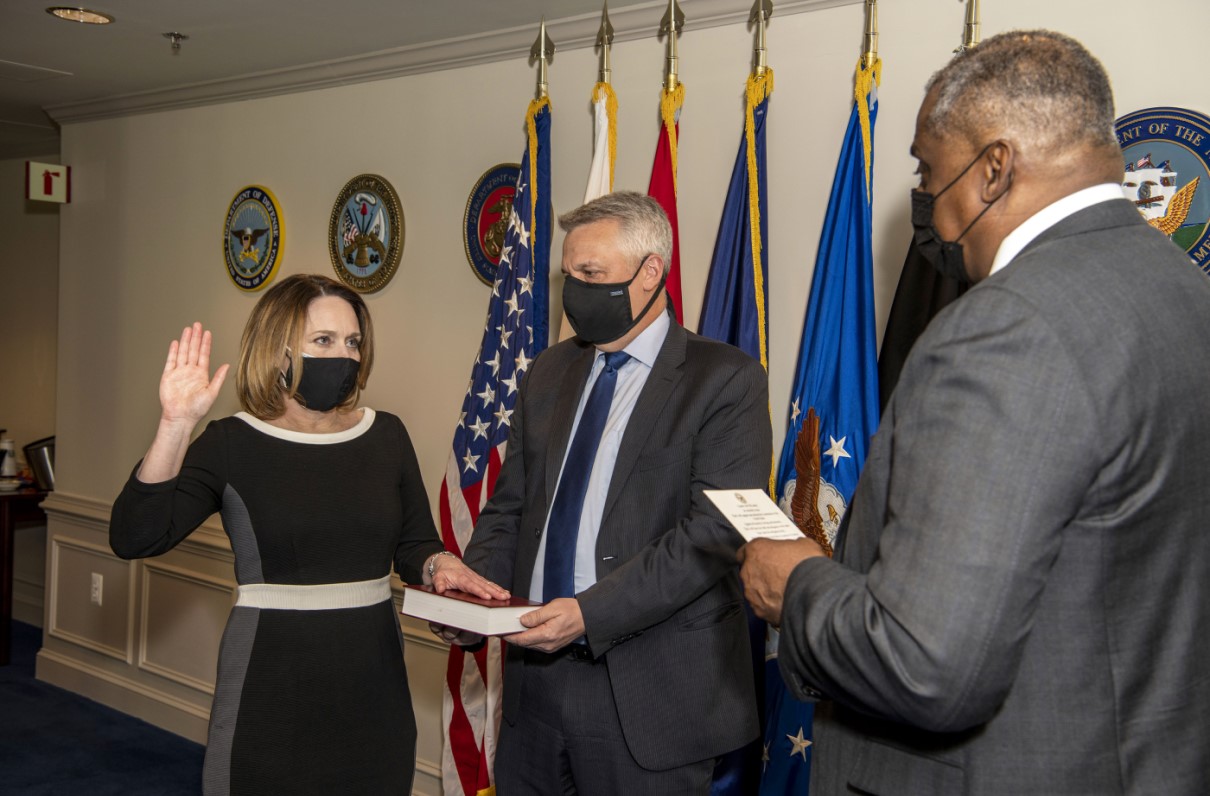New Secretary of Defense Lloyd Austin, a retired Army four-star general, already has begun to address some of MOAA’s priorities. As MOAA noted in a Jan. 22 post on the new secretary’s confirmation, we were heartened by his pledge to combat sexual harassment and assault within the military, and to improve housing conditions for servicemembers and their families, as well as his commitment to protecting the role of civilian leadership in DoD.
Kathleen Hicks, who was sworn in as deputy secretary of defense by Austin on Feb. 9, also committed to these shared priorities. The first woman confirmed by the Senate to take over DoD’s No. 2 civilian position, Hicks completed a lengthy Senate Armed Services Committee (SASC) confirmation hearing, fielding questions on the defense budget, audit, and acquisition reform, among other topics.
She highlighted the need to link strategy to the desired security environment as more important than the topline budget number, saying “the country can afford the national security it requires.”
[RELATED: In First Message, New Defense Secretary Cites Pandemic Control as DoD Priority]
Significant SASC confirmation discussions included:
- China is the pacing threat: Deterrence is critical to preventing conflict and avoiding a “fait accompli” event where China has an advantage through modernization.
- Defending forward in the cyber domain: The offense and defense is blurred in cyber, it will threaten logistics, and the National Guard will need to grow cyber capability.
- Sexual harassment and assault: Several senators expressed frustration over lack of progress since 2013.
- Toxic exposure: DoD is the sole source of toxic exposure near many installations from the perfluoroalkyl and polyfluoroalkyl substances (PFAS) found in firefighting foam (learn more at this VA.gov link) Hicks stated it was important to meet with affected families and fulfill commitments established by Congress.
On Jan. 20, MOAA sent a letter to the Biden administration to share areas of immediate concern for the military and veteran communities that the president and the executive branch should tackle within the first 100 days of the new administration via executive actions. DoD priorities included:
- Full Pay Raise: Include a full servicemember pay raise in the President’s FY 2022 Budget request in line with the Employment Cost Index (2.7% for FY 2022).
- No TRICARE Fee Increases: Include no proposals for TRICARE fee increases in the administration budget request. Such fees unfairly shift health care costs to military beneficiaries.
- Reconsider Medical Billet Cuts: Plans to eliminate approximately 18% of medical billets could have negative impacts on medical readiness and beneficiary access to care.
- 30-Day Reserve Component Orders: Require the use of federal orders in increments over 30 days for members of the reserve component activated to help with future COVID-19 support or vaccination efforts.
- Military Installation Modernization: Include military installation family housing, child care facilities, barracks, and facility buildings as part of the strategic support area that requires modernization, and explore predictive maintenance sensors to detect moisture and mold problems that have cost taxpayers billions in construction and health care.
- Plan the Future of Our National Cemetery: As Arlington National Cemetery reaches capacity, designate a location for the next national cemetery that affords full military honors, and grandfather those currently eligible.
- Improve the Dependent GI Bill Transfer Process: Review the service obligation process and inter-department communication for GI Bill transfers to dependents. Administrative errors are leading to dependents being required, unfairly, to pay back GI Bill payments.
These immediate areas of concern will amplify longstanding issues for military readiness, family support, recruiting and retention, and servicemember transition programs.
MOAA will continue to closely monitor and engage DoD and the White House to ensure progress continues on MOAA and The Military Coalition’s priorities.
We encourage our members and partners to stay tuned at MOAA.org and through The MOAA Newsletter for up-to-date information and calls to action to ensure we do all we can to support the health and well-being of our servicemembers and their families.
MOAA Knows Why You Serve
We understand the needs and concerns of military families – and we’re here to help you meet life’s challenges along the way. Join MOAA now and get the support you need.

